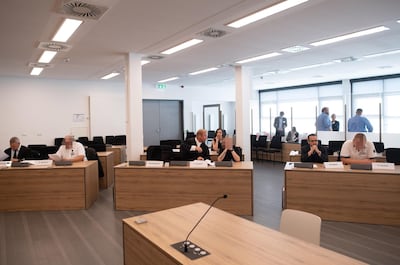A gang of alleged far-right extremists have gone on trial in Germany charged with attacks on officials and refugees.
Four defendants were allegedly members or supporters of the Freital group – named after the town they operated in – which had tried to create "a climate of fear" for migrants moving into Germany in 2015, at the height of refugee crisis.
In Germany, there are widespread concerns at infiltration of far-right supporters in the police and military, and that extremists are becoming emboldened.
Steffi Brachtel, from Freital, began helping refugees in 2015 and found herself and her family the targets of threats.
"It was terrible for me to see the hate and judgement coming from my town. I was born here and had a happy childhood. But now there's also this ugly face," she told DW news.
"You feel powerless. I've always been confident, but then the threats get closer to you. You read the insults online that has information about your own family. It makes you paranoid.”
Members of the Freital group are believed to have taken part in attacks on the car of a local councillor, a politician’s office and a refugee shelter.
The trial of three men and a woman is scheduled to last until next year at the regional superior court in nearby Dresden.
Two of the men, aged 27 and 53, are accused of "membership of a terrorist organisation". The other two defendants, both aged 31, face charges that include being accessories to crimes carried out by the group.
Eight members of the Freital group were jailed in the same court in 2018 on terrorism and attempted murder charges. Prosecutors say the defendants now in court belong to a "second tier" of members.
Immigration became a hot-button issue in Saxony state, home to both Freital and Dresden, which shares a border with Poland and the Czech Republic.
There was already resentment at Chancellor Angela Merkel's liberal refugee policy that led to an increase in asylum seekers.
While Ms Merkel’s policies enjoyed broad support, the far-right used it to try to win supporters to its cause.



